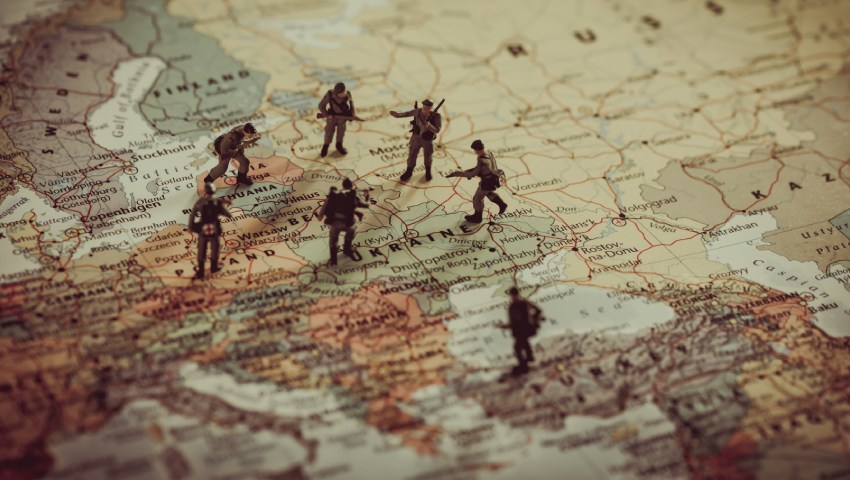An interesting new theory has emerged explaining the slow advance of Russia’s armoured convoy into Ukraine, with online experts suggesting that substandard vehicle maintenance and poorly made Chinese tires have delayed Russian approaches.
To continue reading the rest of this article, please log in.
Create free account to get unlimited news articles and more!
A week into the conflict and theories abound over the state and speed of Russia’s advance into Ukraine. Late last week, media reports cited former commander of the Estonian Defence Forces Riho Terras, arguing that Russia would not be able to materially or economically sustain its advance into Ukraine for more than 10 days. In his analysis, Terras went as far as to suggest that Russia was rationing three to four days reserves of missiles.
Not all analysis has been so dismissive of Russian military and economic capabilities. Recently, Newsweek reported that Russia “has over $630 billion in hard currency reserves” while senior Russian official Viktor Tatarintsev stated bluntly that Russia “doesn’t give a sh*t” about economic sanctions. Russia has also had the opportunity to battleharden and mature their technology throughout the civil war in Syria.
However, there appears to be a level of consensus that the advance of Russian armour has remained conspicuously slow. The United Kingdom’s Ministry of Defence provided an intelligence update on 3 March that the Russian convoy was delayed by “staunch Ukrainian resistance, mechanical breakdown and congestion. The column has made little discernible progress in over three days”. Their previous update alleged the existence of “ongoing logistical difficulties”.
However, there may be new dimensions to the delayed Russian advance: substandard vehicle maintenance prior to the invasion and poorly made Chinese tires.
In early March, online experts took to Twitter to analyse images and videos of abandoned Russian vehicles and obscure vehicle formations, as reported by Peter Weber in The Week.
Examining imagery of abandoned Pantsir-S1 wheeled gun-missile systems, former quality auditor of US Army tactical vehicles Trent Telenko explained that the Russian military vehicles were insufficiently maintained prior to the invasion of Ukraine.
“When you leave military truck tires in one place for months on end. The side walls get rotted/brittle such that using low tire pressure setting for any appreciable distance will cause the tires to fail catastrophically via rips,” Telenko tweeted.
This is a thread that will explain the implied poor Russian Army truck maintenance practices based on this photo of a Pantsir-S1 wheeled gun-missile system's right rear pair of tires below & the operational implications during the Ukrainian mud season.?
— Trent Telenko (@TrentTelenko) 2 March 2022
1/ pic.twitter.com/LmxW43v6gy
The result? Russian convoys were unable to release air pressure from the tires – a necessity when driving through heavy mud – and were forced to take main roads to avoid getting bogged.
The Twitter analysis didn’t stop there, however.
Bit of a tire expert here. Those aren't Soviet-era heavy truck radials. Chinese military tires, and I believe specifically the Yellow Sea YS20. This is a tire I first encountered in Somalia and Sudan; it's a bad Chinese copy of the excellent Michelin XZL military tire design. ??
— Karl T. Muth ?✈️? (@KarlMuth) 3 March 2022
“Those aren't Soviet-era heavy truck radials. Chinese military tires, and I believe specifically the Yellow Sea YS20. This is a tire I first encountered in Somalia and Sudan; it's a bad Chinese copy of the excellent Michelin XZL military tire design,” academic Karl Muth responded to the Twitter thread.
“Yes, all the things in the original thread are valid, but these Chinese tires simply don't have the load ratings needed for equipment like what's shown. They are poorly-constructed and barely-inspected truck radials. The equivalent Michelin product is inspected and x-rayed.”
The recent Russian invasion of Ukraine has bought significant global scrutiny over the capability of Russian military technology.
According to Professor Spence Meredith writing in the Modern War Institute, poor Russian military technology will be bought to global attention in the event of both conventional and irregular combat – and undermine the competitive control the Kremlin exercises over allied rogue nations through military arms sales.
“Specifically, highlighting operational ineptitude and technical malfunctions in Ukraine can impact global arms sales and the Russian brand in the competitive market for private military companies (PMCs). Both costs would heighten intra-elite rivalries in Moscow as losses mount elsewhere,” Professor Meredith said.
“When those failures leave dead Russians in their wake, oft-repeated lies about training deaths in Ukraine, Syria, and the Central African Republic cannot easily convince the growing list of grieving Russian mothers.”
While Russia has this week committed forces to Luhansk and Donetsk, the insurgency deterrent may dissuade the Kremlin from yet further activity.
Get involved with the discussion and let us know your thoughts on Australia’s future role and position in the Indo-Pacific region and what you would like to see from Australia's political leaders in terms of partisan and bipartisan agenda setting in the comments section below, or get in touch with
Liam Garman
Editor – Defence and Security, Momentum Media

 Login
Login








